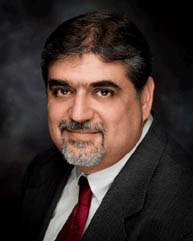Dreaming together for a better world
Dreaming together for a better world McGill University
User Tools (skip):
Dreaming together for a better world
Papadopoulos to oversee MUHC Research Institute

Dr Vassilios Papadopoulos will help advance "the highest quality medical research at McGill and affiliated hospitals," said Heather Munroe-Blum, principal and vice-chancellor.
COURTESY OF GEORGETOWN UNIVERSITY
Emil Skamene, the founding scientific director of the Research Institute of the McGill University Health Centre (MUHC), called research "the guiding spirit ingrained in the soul of the MUHC." It is fitting that for his successor, research has been a lifelong pursuit. Vassilios Papadopoulos remembers his childhood in Athens as a series of informal but determined experiments involving building toy airplanes and pondering why flies fly.
That boyhood curiosity foreshadowed a career that has been honoured throughout the world. Starting July 1, 2007, Papadopoulos will lead one of the world's top biomedical and health-care hospital research centres, overseeing more than 500 researchers and 1,000 students in more than 300 laboratories. He brings an international reputation as a biochemist and pharmacologist, and a proven track record of leadership in biomedical research and administration.
He said, "When we conduct research, what we do is dream together. Research is about how to make the cell better, the organism better, the world better. It's about taking care of disease."
Of his appointment, McGill Principal and Vice-Chancellor Heather Munroe-Blum said, "Dr Papadopoulos is an accomplished researcher in his own right. He brings to this vital leadership position insight, experience and a deep commitment to advancing the highest quality medical research at McGill and affiliated hospitals."
Currently Georgetown University Medical Cen-ter's associate vice-president and director of the Biomedical Graduate Research Organization, Papado-poulos researches diseases related to abnormal steroid levels and altering steroid compartmentalization as a means to block disease.
His work has major implications for aging, cancer, reproduction and development, as well as brain disorders such as Alzheimer's and infectious diseases such as AIDS.
Dr Richard Levin, dean of the Faculty of Medicine and vice-principal (Health Affairs), said, "We feel very privileged that Professor Papadopoulos has chosen to join the Faculty of Medicine. He brings with him great expertise and research-based knowledge and is the acknowledged leader in his field. We look forward with great excitement to this new chapter of McGill biomedical research."
Papadopoulos has been honoured in every part of the world where he has conducted research, from Australia, where he was granted the Sandoz Award from the Endocrine Society, to the United States, where he received Georgetown's Biotechnology Leadership Award, to France, where he was elected a member of the National Academy of Pharmacy.
After receiving his Diploma of Pharmacy at the University of Athens and his PhD in Health and Life Sciences at the Université Pierre et Marie Curie in Paris, Papadopoulos completed post-doctoral research in Australia and France.
With the appointment, Papadopoulos has also been named a professor in the Faculty of Medicine at McGill and associate executive director for research at the MUHC. MUHC Director General and CEO Arthur Porter said, "Under his leadership, the Research Institute of the MUHC will continue to push the boundaries of health-care research."

